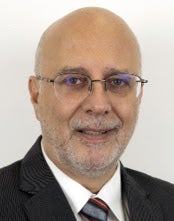Vanderlei S. Bagnato received his Master's degree in Physics from the University of São Paulo - Instituto de Fisica de Sao Carlos (USP-IFSC), Brazil, and his PhD in Physics from Massachusetts Institute of Technology (MIT), USA. He is currently a professor of Physics at USP-IFSC and a professor of biomedical engineering at Texas A&M University, USA.
He works in the fields of optics, atomic and molecular physics with cold atoms and biophotonics. In atomic physics, he is a pioneer in the production of cold atoms, and his main contributions rely on experiments with Bose-Einstein condensation, quantum turbulence, and the production of the first Atomic Clock in Latin America. In biophotonics, he has made seminal contributions to the use of photodynamic action for the treatment of cancer and microbiological control, including antibiotic-resistant infections.
Bagnato is a driving force for physics in Brazil and South America. He has developed and led a very successful biomedical optics research program, which produced multiple start-up companies providing the local community with new employment opportunities. His group implemented the first clinical use of Photo-Dynamic-Therapy for the treatment of cancer and microbiological control in Brazil. He has developed and published instructional materials for students and young researchers on a broad area of optics and its applications and established a special TV channel to share lectures and demonstrations with the whole Brazilian population.
Bagnato has published over 700 scientific papers and advised more than 120 graduate students. He has received several national and international awards, including the Robert E. Hopkins Leadership Award, the Almirante Álvaro Alberto Award, the Comendador da Ordem Nacional do Mérito Científico from the President of Brazil, and the 24th Prize José Reis. He is an Optica Fellow and a member of the Brazilian Academy of Sciences, The World Academy of Sciences (TWAS), the US National Academy of Science, and the Vatican's Pontifical Academy of Sciences. He has several international collaborations and coordinates several Brazilian and international projects. He is also dedicated to the diffusion of science and the transformation of science into social benefits through innovation.

